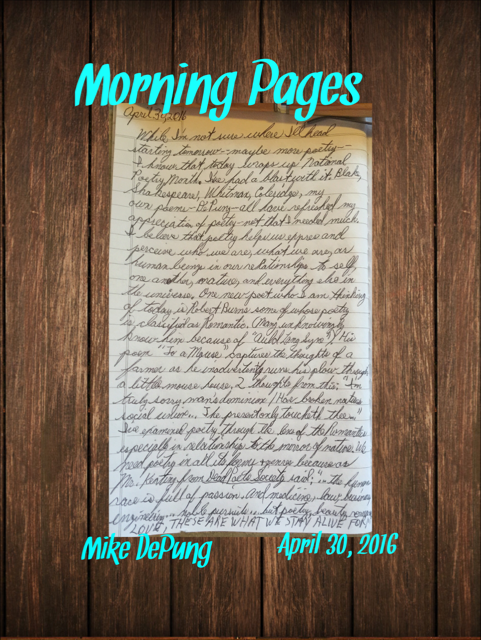 Did you ever come across some old pictures, chuckle a bit, cry a bit, or just reminisce in awe as you looked through the box or album remembering the people, personalities, mountains, beaches, sunsets, waves, etc.? To me, that’s lyric poetry. Poetry reminds me of who and what we are as amazing, complex, fault-ridden yet perfect human beings. The right words in the right order, words that communicate the magic of life — whether it is black or white magic. Such magic intrigues me, and I have had a blast exploring that this National Poetry Month, a month that has renewed my appreciation of the value of words and poetry. It doesn’t all appeal to me, but neither do all people or wines or foods or cultures — you get it; however, I can appreciate those which I encounter. Because of my predilection for Romantic philosophy and writing, I have viewed poetry and, consequently, life this past month through that lens. Another poem that I have been thinking of this month and one that I used to introduce the Romantic Period to my students is “To a Mouse,” written by Robert Burns, who you know from the New Year’s song “Auld Lang Syne.” The poem captures the moment that a farmer inadvertently plows through a mouse’s house and startles the little creature. Burns and his narrator use this occasion to reflect on the relationship of nature and humans — (he primarily wrote this, purposefully, in an archaic Scottish dialect): “I’m truly sorry man’s dominion / Has broken Nature’s social union, / An’ justifies that ill opinion,/ Which makes thee startle, / At me, thy poor, earth-born companion, / An’ fellow mortal!” In these few lines, the farmer proclaims the sympathies of caring and cognizant and aware humanity: nature has a justified fear of us, even though we are on the same planet. The farmer takes it further as he communes with the little mouse about all of the mouse’s preparations against winter, and one of the most famous lines sums up his reasoning: “But Mousie, thou art no thy-lane [not alone], / In proving foresight may be vain. / The best laid schemes o’ mice an men gang aft agley [often go amiss], An’ lea’e us nought but grief and pain / For promised joy.” Yes, the title to John Steinbeck’s famous novel Of Mice and Men is taken directly from this poem, and the plot line resonates with it. However, the second point I would like to take from this poem derives from the last stanza in which the farmer declares “Still, thou are blest, compar’d wi’ me! / The present only toucheth thee: / But oh! I backward cast my e’e, / On prospects drear! / An forward, tho’ I canna see, / I guess an’ fear!” We as humans, in all of our abilities, choose to engage in life-altering worry over the past that cannot be changed and over the future that we do not know. The mouse, though, just looks at the now, the present, and would think, “Hey, I need a new house. Better get about the business of building it. Isn’t it a nice day?” Or something like that! No worry. Nature used as a mirror, showing us who and what we are as humans and offering us helpful, instructive insight — awesome! I finish this month with the words of the character John Keating (played by Robin Williams) from the film Dead Poets Society: “We don’t read and write poetry because it’s cute. We read and write poetry because we are members of the human race, and the human race is full of passion. Medicine, law, business, engineering — these are noble pursuits and necessary to sustain life, but poetry, beauty, romance, love — these are what we stay alive for.” We need these human family snapshots to keep us grounded, and they may actually help us to come to know Self. That’s worth spending a little time of looking through the humanity family album in the form of poetry!
0 Comments
Leave a Reply. |
Questions to consider:How many times have you asked yourself or simply thought about the following questions?
Who am I, really? What is my truth? How do my actions reveal what I really feel and believe? What would I do with my life if I could do anything? What is my passion? Why am I here? How can I discover answers to any of these questions? If you have considered any of these questions, I hope that my experiences and writing will give you some guidance. Please read my blog and comment and share your thoughts. I would love to hear from you! Archives
December 2019
Categories |

